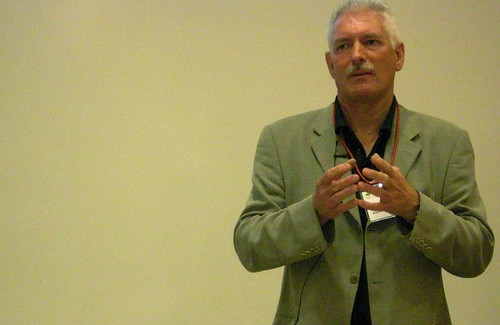
Pierre Trimbach, of the historic Alsatian wine family that’s been making wine in the northeast of France since 1626, doesn’t get out much.
He leaves much of the travel and marketing duties to his brother Jean, while Pierre is most comfortable at home in the winery steering vintages of Riesling, Gewurztraminer, Pinot Gris, Muscat, Pinot Blanc and Sylvaner, 1.2 million bottles per year, through the winemaking process.
But when asked by Cave Spring Cellars winemaker and co-founder Angelo Pavan to come to Brock University as the keynote speaker for the 2011 Riesling Experience, he dutifully jumped on a plane and headed to Canada for his first trip to this country to talk Riesling and share insights with a region that’s barely just getting started (when compared to Alsace, where the first known Riesling vines can be traced to 1435).

Domaine F.E. Trimbach is a family run winery based in Ribeauville, Alsace.
Pierre makes the wines and brother Jean sells it. They are the 12th generation family members to take the helm at the respected Alsatian winery, farming 40 hectares organically in three of its own vineyards (Rosacker, home to the legendary Clos Ste. Hune, Osterberg and Geisberg) and purchasing another 95 hectares of grapes from a patchwork of over 100 small and medium-sized growers to feed its million-plus production of predominantly aromatic white wines.
About half of the production at Trimbach, 568,000 bottles annually, is Riesling. The firm knows a thing or two about Riesling, how to grow it and how to coax the coveted minerality out of each bottle that is made at the winery.
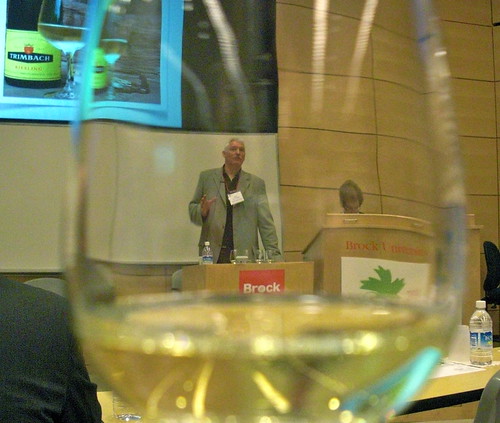
If Trimbach made one thing clear during his talk on Riesling at Brock, nothing is more important than history and experience, where you grow the grapes and an instinctive nose for knowing when something’s going amiss in the winery.
And he’s outspoken on several topics, including Rhone producer Michel Chapoutier’s recent comments in Decanter Magazine that Alsace Riesling “should never smell of petrol. That is a result of a mistake during winemaking.”
Chapoutier, who is making his first foray into Alsatian wines and is about to release his first vintage after purchasing land there, said the petrol characteristics, desired by many lovers of aged Riesling, are undesirable and constitute a fault in the wine, he told Decanter.
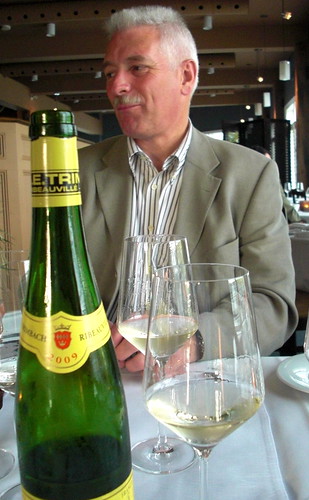
He compared the debate over petrol aromas in Riesling to the issue of brettanomyces, and told Decanted that it is absurd that “historical defects in wine should be accepted as part of the character of the wine.”
The Decanter article quoted Chapoutier as saying that the petrol characteristic is a result of decomposition of the veins within the grape. These veins become more fragile as the grape matures. The vital aspect of Riesling vinification, according to the Decanter article, is the gentlest of pressings, often taking 12 hours, Chapoutier said, so as to avoid breakdown of the vascular structure within the grape.
Trimbach was asked repeatedly during his visit to Canada (in Niagara, Toronto and Montreal) for reaction to Chapoutier’s remarks. At Brock he was guarded in front of the 100 people or so who paid to hear him speak and taste his wines.
“When we are talking about petrol,” he said, “it is the noble evolution of the wine after 10 years or more. Petrol is not a good term. Now we say ‘minerality.’ ”
Trimbach says, and I tend to agree with a guy who’s got bottles of Riesling in his cellar dating back to 1834, that petrol in a young wine is actually reduction in the wine caused by grapes that have suffered from dryness and competition during drought conditions.
Later, during a private dinner at Treadwell Farm to Table Cuisine, Trimbach was a little more candid about Chapoutier’s remarks.
First of all, “Mr. Chapoutier isn’t from Alsace,” he said. Ouch!
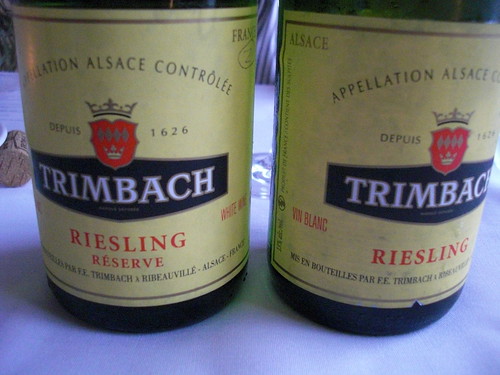
Second of all, Trimbach said, petrol is not a term used much in Alsace anymore because it’s taken on “negative” connotations. “We don’t talk about petrol (in young wines), we talk about reduction,” he said. “In that Mr. Chapoutier is correct.” The lovely petrol-like aromas that emerge in older Rieslings, he said, after a minimum of five years in bottle, is actually minerality that evolves in the bottle.
He said those petrol notes in a young wine are reductive imperfections in the wine caused by water stress and grapes planted in the wrong type of soil (limestone and calcareous soils are the best for producing the “good” minerality notes). It is not, he stressed, from poor winemaking techniques in the winery, as Chapoutier contends.
Other factors, as well, affect reduction in wine including high sun (UV) exposure and high acids in the wine.
So, says Trimbach, “the winemaker can’t change anything in the winery. It (petrol, premature or otherwise) comes from the soil.”
•••
Some other notes from a day (and night) with Pierre Trimbach.
Trimbach poured several of his wines at the Riesling Experience, many of which will be coming to Vintages in the coming months through Trimbach’s Canadian agent, Woodman Wines and Spirits.
Trimbach Riesling Reserve 2009 ($28, current vintage at Vintages is 2008, 91 points) — A very young wine (these Rieslings can age for 15 years or more) with a nose of green apple, quince, citrus and a hint of minerality. It shows steely firmness on the palate with wet stone, smoky apple-lime flavours and a crisp, clean finish.

Trimbach Cuvee Frederic Emile Riesling 2001 ($80, 93 points) — From 45-year-old estate grapes, farmed organically in two vineyards. The 2001 vintage was the best of the decade, says Trimbach, and, oh my, what a wine! Such a mineral-stony, and, yes, petrol nose with smoky stone fruits just now opening up. The fruit is explosive on the palate and adds integrated acid, minerality and intensity that grows with each sip. This is a Riesling with broad shoulders that will evolve for decades.
•••
Trimbach quote of the day, when asked what the secret is to making great aged Alsatian Riesling:
“First, is balance. Second, is balance. Third is balance. And the rest is blah, blah, blah. The key is not too much of this and not too much of that.”
•••
At a private dinner at Treadwell Farm to Table Cuisine with Trimbach and owner of the Canadian wine agency that represents his wines, Russell Woodman (Woodman Wines and Spirits), I followed Trimbach’s lead in ordering from the menu.
We started with chilled pea soup with seared east coast sea scallops, crème fraiche and parmesan “straw” which paired brilliantly with the Trimbach Classic Riesling 2009 ($19, coming to Vintages soon), the Trimbach Riesling Reserve 2008 ($26, in Vintages now) and the Trimbach Frederic Emile Riesling 2005 ($59, Vintages Classics Catalogue).
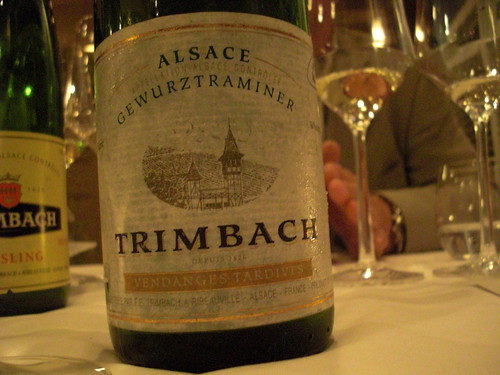
Trimbach then ordered the pan roasted Lake Huron whitefish with asparagus, smoked bacon lardons, goat’s cheese ravioli, preserved lemon and shallot beurre noisette for us. This was delicious with Trimbach Pinot Gris Reserve 2007 ($23, Oct. 1 release at Vintages) with gorgeous honey-kissed melon, exotic spices, and lovely texture.
We parted ways on dessert, Trimbach ordered dark chocolate and cream cheese “brownie” with chocolate sorbet & “whitty farms” raspberries while I went with the James Treadwell recommended fennel pollen pound cake with rhubarb consommé and honey ice cream. Dessert was paired with Trimbach Cuvée des Seigneurs de Ribeaupierre Gewurztraminer 2004 ($39, Vintages V-mail offer coming soon) and the Trimbach Gewurztraminer Vendanges Tardives 2005 ($59, Vintages Classics Catalogue, Oct.), a sensational match with the rhubarb dish with pure, exotic flavours of grapefruit, wild honey, lychee, nutmeg and musk. An unctuous, and purely hedonistic beauty.
•••
A food tip from Pierre Trimbach that’s simple and possibly the world’s greatest food-wine pairing:
Boiled potatoes, sliced and slathered in butter. Serve with Munster cheese from Alsace and pair with Trimbach Gewurztraminer. Heavenly.
Enjoy!






Comment here